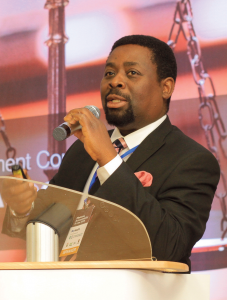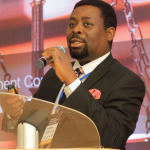[dkpdf-columns columns=”3″ equal-columns=”false” gap=”10″]

Doctor, I happy say na you I meet, I don dey pray say make I meet the doctor wey get bear-bear for hospital today”, said the smiling lady sitting opposite me, in impeccable pidgin English. I recognised her from more than a decade in the past. She was the wife of one of the members of staff of a long defunct government parastatal, which had a “Retainership Agreement” with the private hospital in Lagos, Nigeria, in which I am a partner.
“Na dis pikin O!”, she continued, pointing to the teenage boy beside her. “Na here we born am. Na him dey sick. As I dey here my broda, chichi no dey my han. Even sef, na you go give us danfo moni to go house.”
The foregoing translates roughly to mean the lady was happy (don’t tell my partners, but she probably considered me to be kindhearted) to see the bearded doctor (I have worn a beard for almost 40 years) but didn’t have any money to care for her ailing child who had been born in my hospital. She expected me to provide both free treatment and transport fare back home, with a little “extra”. I complied with her request
The Problem
So, here was I in a private hospital, compelled to administer both care and charity on the very tenuous basis of a lapsed business relationship. Amusing as the incident may have been, it was evidently indicative of the creeping malady afflicting the Nigerian healthcare delivery system. Some of my colleagues in the teaching hospitals had admitted going to work without any money whatsoever on their persons, to avoid funding care delivery to patients out of sympathy. Clearly, the contagion had now reached the private sector. I knew then, that we were in the middle of a countrywide healthcare delivery emergency.
The Reality
Healthcare is never free. Someone or something always has to pay. In the times of plenty in Nigeria, Western-style healthcare delivery in urban public hospitals was funded largely by government. Private healthcare delivery was at best rudimentary. The triad of a population explosion, massive urban migration and dwindling oil revenue meant an increasing recourse to private care, as government hospitals became “mere consulting clinics” and public healthcare infrastructure became dilapidated. The outcome is that in 2014, private expenditure on health as a share of total health expenditure in Nigeria was almost 75%. To ask each of the 3 tiers of government to reverse this trend is unrealistic, not only because of competing obligations but also because in an absolute sense, the funds are simply not available. For many decades, the Federal Government of Nigeria spent oil revenue to fund the budget and neglected tax revenue in the process. When in the recent past, the precipitous drop in oil prices triggered a recession and near collapse of the economy, the focus shifted to taxation as a more dependable source of revenue.
…a nation of tax evaders
Unfortunately, statistics reveal that Nigeria appears to be a nation of tax evaders or to put it more politely, tax compliance in Nigeria is poor. According to the Joint Tax Board, there are ten million people (precisely 10,006,304) registered for personal income tax purposes in all the states of the federation including the FCT. Out of these, about 4.6 million or 40% are registered with the Lagos State Internal Revenue Service (LIRS) indicating an average of 153,000 or 1.5% per state for others. Compared to the labour workforce estimated at 77 million at the end of 2015 according to the National Bureau of Statistics (NBS), the number of people in the tax net is only 13%.
Total tax collection in Nigeria for the year 2017 by Federal and State agencies is still being collated but is projected to be approximately N6 Trillion or about $20 Billion. This is an abysmal figure when compared with the $60 Billion collected by our continental neighbour, South Africa, which has a smaller GDP and about one-third of our population. In other words, our tax collection efficiency is only about 10% that of South Africa. Suffice it to say that for the foreseeable future, the necessary activities of the three tiers of Nigerian government cannot be fully funded by taxation or petroleum revenues or the combination of both.
The Proclamation
How then can healthcare delivery be funded in Nigeria? The health funding scenario in Nigeria and other comparable economies led to the passing of Resolution 58.331 at the 58th World Health Assembly, urging member states – “to ensure that health-financing systems include a method or prepayment of financial contributions for health care, with a view to sharing risk among the population and avoiding catastrophic health-care expenditure and impoverishment of individuals as a result of seeking care.”
Professor Eyitayo Lambo, world-renowned health economist and Nigerian Minister of Health in 2003 – 2007, was highly instrumental in convincing the President Olusegun Obasanjo-led Federal Government to kick-start the National Health Insurance Scheme (NHIS). The Scheme had been birthed by decree in the ying days of the preceding military administration but had not been made operational. By a stroke of administrative legerdemain, the Federal Government agreed to pay premiums on behalf of all public servants, and the NHIS sprang to life.
Alas, that’s where the fairytale ends. The stated Vision and Mission of the Organisation as published in the October 2005 edition of the Operational Guidelines of the NHIS, are highlighted in figure 1.
Political Will
The absence of a clause which makes health insurance mandatory for any component of the Nigerian citizenry is thought by many commentators to be the gravest failing of the Decree (now Act) Number 35 of 1999. If any progress is to be made in that regard, there needs to be a re-enactment of Act Number 35, driven by a shared agreement within the regulatory and policy communities and with the involvement of key stakeholders.
The Pension Reform Act, 2014 has established the effectiveness of a compulsory piece of legislation in achieving compelling results, even in the Nigerian environment. The pension scheme applies to any and all organisations with 3 (three) or more employees in the private sector. Behold, by the end of 2016, a total of N6.164 trillion had accumulated in the Retirement Savings Accounts of the workers registered under the scheme. This would never have been possible if the Pension Reform Act had been made optional.
The afore-mentioned NHIS Act 35 of 1999 had another major flaw in that failed to accommodate Nigeria’s federating units, the 36 States and the Federal Capital Territory on acceptable and equitable terms. The States
… our tax collection efficiency is only about 10% that of South Africa
have now picked up the gauntlet! With the encouragement of international agencies such as the IFC, Lagos State passed the Health Scheme Act in May 2015, which made subscription mandatory for more than 20 million residents of the State, exactly sixteen years after the NHIS Act Number 35 of 1999. Operational modalities for the Scheme are being fashioned out, from which a quintupling of the size of the existing Nigerian health insurance industry is anticipated in the near future.
Happily following the example of Lagos State, other states such as Abia, Kwara, Delta, Ekiti, Kano, Bauchi, Cross River, Ogun, Enugu, Anambra, Oyo, Ondo, Kano and Ebonyi, have either passed or are in the process of passing fit-for-purpose health insurance legislation on behalf of their citizenry.
Conclusion
In a market economy where demand is cashbacked, supply immediately responds with provision and competition and regulation then smooth-out the rough edges. The stakeholders in the Nigerian health insurance space are optimistic that once the funding requirements for the demand side of the healthcare equation is met through guaranteed revenue streams from a well-implemented, coordinated and properly administered National health insurance programme, the supply side will respond with state-of-the-art healthcare delivery facilities.
[/dkpdf-columns]
read moreDisclosure forms provided by the author are available at NEJM.org.
Editor’s note:
Author Affiliations
Supplementary Material
| Disclosure Forms | 83KB |
Add your Comment
Add your Comment
BHQJ 2018 ; 001:34-36
Related Article 
Medical Negligence & the Law5th May 2018 . Atrogenic harm is a matter of significant concern in Nigeria admin
Colorectal Cancer Overview5th May 2018 . [dkpdf-columns columns="3" equal-columns="false" gap="10"] Introduction Colorectal cancer is a major admin
Funding Healthcare Services in Nigeria – A conundrum of demand, policy and supply!5th May 2018 . [dkpdf-columns columns="3" equal-columns="false" gap="10"] Doctor, I happy say na you admin
5 “Provocations” of Healthcare Quality Reform6th May 2018 . [dkpdf-columns columns="3" equal-columns="false" gap="10"] n the four decades since he admin
Health Insurance, Activism & Urgent Change6th May 2018 . [dkpdf-columns columns="3" equal-columns="false" gap="10"] AR: Dr Soyinka, it’s wonderful to admin
Anne Olowu talks about her “Masterclass” experience6th May 2018 . [dkpdf-columns columns="3" equal-columns="false" gap="10"] As I suspect is the case admin
Stomach & Oesophageal Cancer in Nigeria6th May 2018 . [dkpdf-columns columns="3" equal-columns="false" gap="10"] Gastric and Oesophageal (Upper GI) cancers admin
Setting out the Stall!7th May 2018 . [dkpdf-columns columns="3" equal-columns="false" gap="10"] "The drawbacks of our false knowledge admin


